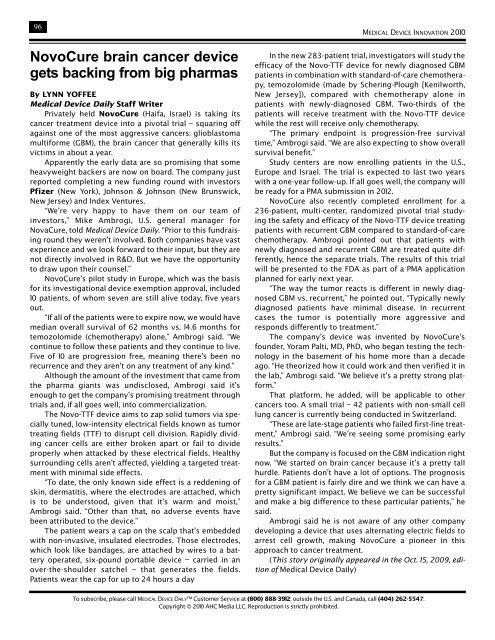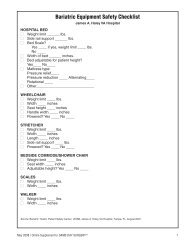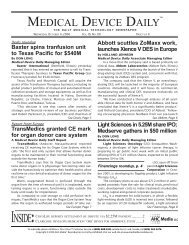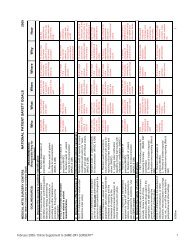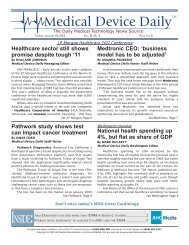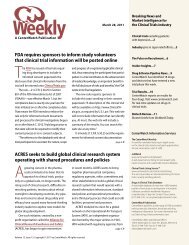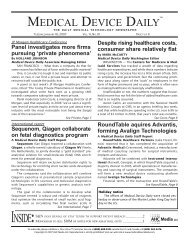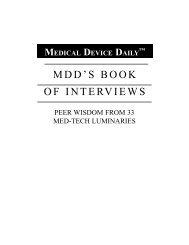MEDICAL DEVICE INNOVATION - Medical Device Daily
MEDICAL DEVICE INNOVATION - Medical Device Daily
MEDICAL DEVICE INNOVATION - Medical Device Daily
Create successful ePaper yourself
Turn your PDF publications into a flip-book with our unique Google optimized e-Paper software.
96<br />
NovoCure brain cancer device<br />
gets backing from big pharmas<br />
By LYNN YOFFEE<br />
<strong>Medical</strong> <strong>Device</strong> <strong>Daily</strong> Staff Writer<br />
Privately held NovoCure (Haifa, Israel) is taking its<br />
cancer treatment device into a pivotal trial – squaring off<br />
against one of the most aggressive cancers: glioblastoma<br />
multiforme (GBM), the brain cancer that generally kills its<br />
victims in about a year.<br />
Apparently the early data are so promising that some<br />
heavyweight backers are now on board. The company just<br />
reported completing a new funding round with investors<br />
Pfizer (New York), Johnson & Johnson (New Brunswick,<br />
New Jersey) and Index Ventures.<br />
“We’re very happy to have them on our team of<br />
investors,” Mike Ambrogi, U.S. general manager for<br />
NovaCure, told <strong>Medical</strong> <strong>Device</strong> <strong>Daily</strong>. “Prior to this fundraising<br />
round they weren’t involved. Both companies have vast<br />
experience and we look forward to their input, but they are<br />
not directly involved in R&D. But we have the opportunity<br />
to draw upon their counsel.”<br />
NovoCure’s pilot study in Europe, which was the basis<br />
for its investigational device exemption approval, included<br />
10 patients, of whom seven are still alive today, five years<br />
out.<br />
“If all of the patients were to expire now, we would have<br />
median overall survival of 62 months vs. 14.6 months for<br />
temozolomide (chemotherapy) alone,” Ambrogi said. “We<br />
continue to follow these patients and they continue to live.<br />
Five of 10 are progression free, meaning there’s been no<br />
recurrence and they aren’t on any treatment of any kind.”<br />
Although the amount of the investment that came from<br />
the pharma giants was undisclosed, Ambrogi said it’s<br />
enough to get the company’s promising treatment through<br />
trials and, if all goes well, into commercialization.<br />
The Novo-TTF device aims to zap solid tumors via specially<br />
tuned, low-intensity electrical fields known as tumor<br />
treating fields (TTF) to disrupt cell division. Rapidly dividing<br />
cancer cells are either broken apart or fail to divide<br />
properly when attacked by these electrical fields. Healthy<br />
surrounding cells aren’t affected, yielding a targeted treatment<br />
with minimal side effects.<br />
“To date, the only known side effect is a reddening of<br />
skin, dermatitis, where the electrodes are attached, which<br />
is to be understood, given that it’s warm and moist,”<br />
Ambrogi said. “Other than that, no adverse events have<br />
been attributed to the device.”<br />
The patient wears a cap on the scalp that’s embedded<br />
with non-invasive, insulated electrodes. Those electrodes,<br />
which look like bandages, are attached by wires to a battery<br />
operated, six-pound portable device – carried in an<br />
over-the-shoulder satchel – that generates the fields.<br />
Patients wear the cap for up to 24 hours a day<br />
<strong>MEDICAL</strong> <strong>DEVICE</strong> <strong>INNOVATION</strong> 2010<br />
In the new 283-patient trial, investigators will study the<br />
efficacy of the Novo-TTF device for newly diagnosed GBM<br />
patients in combination with standard-of-care chemotherapy,<br />
temozolomide (made by Schering-Plough [Kenilworth,<br />
New Jersey]), compared with chemotherapy alone in<br />
patients with newly-diagnosed GBM. Two-thirds of the<br />
patients will receive treatment with the Novo-TTF device<br />
while the rest will receive only chemotherapy.<br />
“The primary endpoint is progression-free survival<br />
time,” Ambrogi said. “We are also expecting to show overall<br />
survival benefit.”<br />
Study centers are now enrolling patients in the U.S.,<br />
Europe and Israel. The trial is expected to last two years<br />
with a one-year follow-up. If all goes well, the company will<br />
be ready for a PMA submission in 2012.<br />
NovoCure also recently completed enrollment for a<br />
236-patient, multi-center, randomized pivotal trial studying<br />
the safety and efficacy of the Novo-TTF device treating<br />
patients with recurrent GBM compared to standard-of-care<br />
chemotherapy. Ambrogi pointed out that patients with<br />
newly diagnosed and recurrent GBM are treated quite differently,<br />
hence the separate trials. The results of this trial<br />
will be presented to the FDA as part of a PMA application<br />
planned for early next year.<br />
“The way the tumor reacts is different in newly diagnosed<br />
GBM vs. recurrent,” he pointed out. “Typically newly<br />
diagnosed patients have minimal disease. In recurrent<br />
cases the tumor is potentially more aggressive and<br />
responds differently to treatment.”<br />
The company’s device was invented by NovoCure’s<br />
founder, Yoram Palti, MD, PhD, who began testing the technology<br />
in the basement of his home more than a decade<br />
ago. “He theorized how it could work and then verified it in<br />
the lab,” Ambrogi said. “We believe it’s a pretty strong platform.”<br />
That platform, he added, will be applicable to other<br />
cancers too. A small trial – 42 patients with non-small cell<br />
lung cancer is currently being conducted in Switzerland.<br />
“These are late-stage patients who failed first-line treatment,”<br />
Ambrogi said. “We’re seeing some promising early<br />
results.”<br />
But the company is focused on the GBM indication right<br />
now. “We started on brain cancer because it’s a pretty tall<br />
hurdle. Patients don’t have a lot of options. The prognosis<br />
for a GBM patient is fairly dire and we think we can have a<br />
pretty significant impact. We believe we can be successful<br />
and make a big difference to these particular patients,” he<br />
said.<br />
Ambrogi said he is not aware of any other company<br />
developing a device that uses alternating electric fields to<br />
arrest cell growth, making NovoCure a pioneer in this<br />
approach to cancer treatment.<br />
(This story originally appeared in the Oct. 15, 2009, edition<br />
of <strong>Medical</strong> <strong>Device</strong> <strong>Daily</strong>)<br />
To subscribe, please call <strong>MEDICAL</strong> <strong>DEVICE</strong> DAILY Customer Service at (800) 888-3912; outside the U.S. and Canada, call (404) 262-5547.<br />
Copyright © 2010 AHC Media LLC. Reproduction is strictly prohibited.


